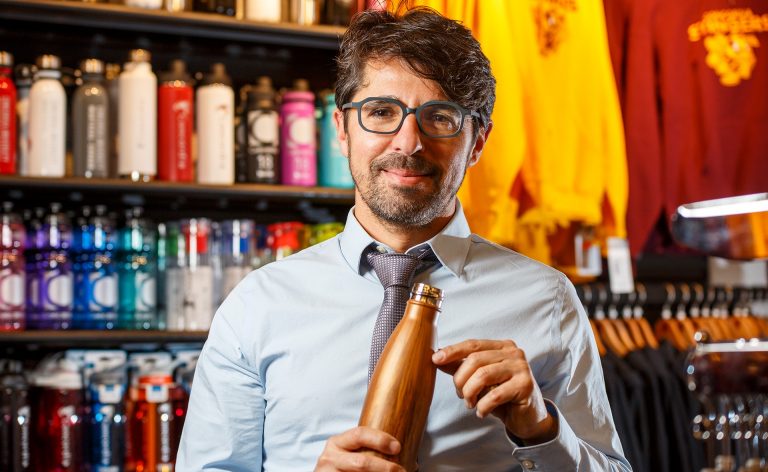Concordia research shows that using green products leads to a warm glow in shoppers

Canadians spend a lot of money around this time of year, on gifts, food, entertainment and travel. In its annual study of holiday season spending habits, the accounting firm PwC estimates that the average Canadian consumer will drop close to $1,600 in 2019.
And while the holidays are associated almost as much with stress as they are with shopping, a new paper out of Concordia’s John Molson School of Business suggests that spending some of that money on green products might make consumers feel quite a bit better about their purchases.
The study looks at the so-called “greenconsumption effect” — how using a green product creates a “warm glow” feeling in users — and what it means for retailers in an increasingly eco-conscious marketplace. Onur Bodur, professor of marketing, and his now-former PhD student Ali Tezer, currently an assistant professor at HEC Montréal, published the paper in the Journal of Consumer Research.
“The warm glow is a good overall feeling,” Bodur says. “It is found in other literature relating to pro-social behaviour. You get the feeling when you help others and have a sense of accomplishment that gives you satisfaction.”
Bodur says Tezer approached him with the idea after watching a 3D movie and learning that the disposable glasses were made of recycled plastic. That knowledge led to a heightened sense of enjoyment while watching the movie, even though he had no say in choosing to use the product.
 Photo by Anna Oliinyk, on Unsplash
Photo by Anna Oliinyk, on Unsplash
Feel green, feel good
To conduct their research, Bodur and Tezer set up five experiments using a variety of products. They were looking to test the conditions under which participants say they experienced a warm glow feeling.
They looked at how green options affect product enjoyment, their perceived quality, the consumer’s sense of social worth, how social exclusion affects green product enjoyment and whether the product’s environmental impact mitigates the warm glow feeling.
They found that green products do generally affect consumers in a positive way. Participants who listened to music on a set of green-labelled headphones reported enjoying the music more than listeners using conventional headphones and added that they would be more likely to purchase them.
Participants also reported overcoming inherent, long-standing biases against the quality of certain green products, in this case cleaning fluids. Bodur notes that, fairly or not, green dish and laundry detergents are widely believed to be less efficient than their conventional counterparts. After using them, respondents felt that belief no longer applied.
They also reported a higher sense of self-worth and lower perception of social exclusion. Green product users said they experienced warm glow feelings and people who felt isolated from their communities reported feeling less so after using a green product.
However, the researchers did note that the warm glow feeling was absent when consumers felt the environmental impact of the product was low. This was the case when participants were told the ink in a disposable Bic pen was supposedly environmentally friendly, but with negligible impact.
Live the green feeling
To someone who, like Bodur, studies marketing for a living, this greenconsumption effect has serious implications for retailers. Consumers obviously prefer using high-quality sustainable products — but service providers can benefit by providing greener experiences.
“Imagine that the chair you are sitting on is certified bamboo, or the tablecloth at a restaurant is made of recycled materials and the utensils are made of wood,” he says. “You can opt to use sustainable, green products that are more likely to improve your customer’s experience.”
He is also aware of the risk that unscrupulous businesses may see his research and decide to exaggerate or outright falsify their environmental credentials. Doing so, he believes, would be at their own peril.
“I believe consumers are becoming a lot more conscious of green attributes, despite all the confusion with regard to certifications of sustainability,” he says. “The risk will only be eliminated when there is some sort of regulation or standardization of certification.”
Read the cited paper: “The Greenconsumption Effect: How Using Green Products Improves Consumption Experience.”
Professor Bodur explains his research in this short video.


